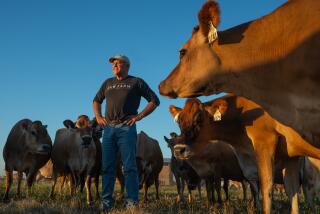The Food Labeling Tangle
A genetically engineered hormone to boost milk production in cows won Food and Drug Administration approval 10 years ago, but the dairy-consuming public still hasn’t fully bought the idea. That’s largely why milk labeled organic has been one of the fastest-growing segments of the food market.
Because the FDA never set clear labeling rules for this food staple, confusion has tangled courts and consumers ever since. It’s time to end the mess, and in a simple way that helps customers make up their own minds.
Monsanto Corp., maker of recombinant bovine somatotropin or rBST, is intent on changing public perceptions of its product. The FDA found that milk from cows given the hormone showed no measurable effect on human health. So Monsanto is suing a Maine dairy that is among many advertising their milk as having “no artificial growth hormones.” The dairy’s wording implies that milk from rBST cows is inferior, Monsanto says, violating FDA rules that prohibit such claims.
It does no such thing. The dairies are not creating consumer attitudes toward rBST, though they’re certainly taking advantage of existing concerns. Polls show that people want to know about artificial hormones and antibiotics used to produce milk. Some accept unsubstantiated claims that the hormone’s use could lead to health problems in humans. Others worry about a more valid concern that the hormone causes more udder infections, thus requiring more use of antibiotics, which can contribute to drug-resistant bacteria. Consumers Union opposes its use. Canada and the European Union ban it, but because of its effect on cows, not humans.
The FDA didn’t help matters 10 years ago when it set up mushy labeling rules, allowing states to set their own labeling laws but pushing for disclaimers along the lines of “No significant difference has been shown between milk derived from rBST-treated and non-rBST-treated cows.”
Food purchasers want to make informed decisions. Were the cattle for their beef fed a vegetarian diet? Is that salmon wild or farmed? Were pesticides used in the orange groves, or artificial hormones in the dairy? The FDA should encourage giving consumers the information to form their own judgments, not cloud the issue and crowd the courts through arcane and unclear rules.
More to Read
Inside the business of entertainment
The Wide Shot brings you news, analysis and insights on everything from streaming wars to production — and what it all means for the future.
You may occasionally receive promotional content from the Los Angeles Times.










